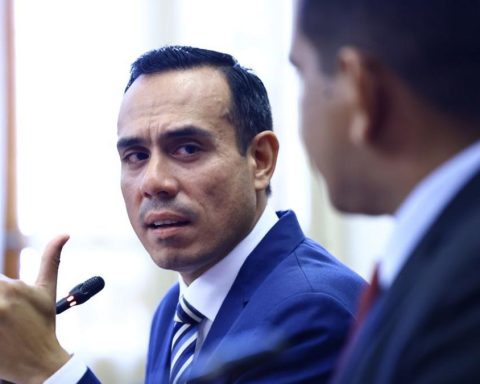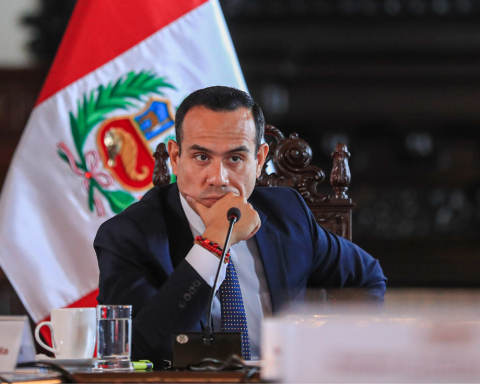Persistent global inflation, recessive pressures, climate change, and the emergence of new digital technologies were identified as the main global risks and challenges at the XIV Annual Conference organized by the Central Reserve Bank of Peru (BCR), The Reinventing Bretton Woods Committee (RBWC) and the Inter-American Development Bank (IDB).
The inauguration was in charge of Julio Velarde, president of the BCR; Marc Uzan, director of the RBWC; and Eric Parrado, Chief Economist of the IDB. Central bank authorities, representatives of international organizations, the private sector and renowned academics participated in the debates.
Also, Jacob Frenkel, President of the Frenkel-Zuckerman Institute for Global Economics and former Governor of the Bank of Israel; Pablo Hernández de Cos, Governor of the Bank of Spain; Alexandre Tombini, head of representation of the Office for the Americas of the Bank for International Settlements, BIS; and Julio Velarde of the BCR, analyzed the challenges of central banks.
The panelists highlighted that the global economic scenario poses complex monetary policy challenges.
“The war in Ukraine has prolonged the occurrence of global inflationary pressures, mainly through energy and food prices, which has postponed the return to inflation target ranges in many countries. This has prompted the withdrawal of the monetary stimuli that were executed in response to the economic impacts of the pandemic and has increased uncertainty about global economic activity.”, they indicated.
They added that in this context of uncertainty in which central banks try to prevent inflationary pressures from affecting medium-term inflation expectations, the calibration of the speed and magnitude of adjustment of monetary policy variables is a complex task.
“Added to this are other fronts, such as taking into account the risks to financial stability caused by the growth of non-bank intermediation and climate change”, they pointed out.
Economic consequences
Participating in the session on the economic consequences of the war in Ukraine were Victoria Nuguer (IDB researcher), Felipe Larraín (Catholic University of Chile), Leonardo Villar (governor of the Bank of the Republic of Colombia) and Luis Oganes (JP Morgan), who emphasized the negative impact on global inflation expectations and the deterioration in economic growth forecasts.
They mentioned that to mitigate this impact, monetary policy should focus on reducing inflationary pressures and governments should direct support measures to the most vulnerable segments of the population. In the case of public policies, they agreed that public spending on social support must be more efficient so as not to interrupt the process of consolidating fiscal accounts.
digital currencies
In the debate on digital currencies issued by central banks (CBDC), Rossana Costa (governor of the Central Bank of Chile), Barry Eichengreen (Berkeley University), Paul Castillo (manager of Monetary Operations and Financial Stability of the BCR) and Ousmène participated. Mandeng (advisor to the technology firm Accenture).
The speakers commented that with the initiatives to issue CBDC they seek to promote financial inclusion and strengthen the efficiency and resilience of payment systems.
“But there is no evidence that a CBDC is the best policy response to the challenges facing payment systems.”, they limited.
Although a CBDC designed with characteristics similar to cash could potentially encourage the use of digital payments, they therefore considered it necessary to study how the use of CBDC could contribute to increasing the efficiency of payment systems.
Climate change
In the last session, Marsha Caddle (The Bold Centre, Barbados), Livio Stracca (European Central Bank, ECB) and Ananthakrishnan Prasad (Director of the IMF Climate Change Unit) discussed the implications of climate change for financial stability.
The speakers explained that there are two risks associated with climate change: the physical destruction caused by natural disasters and the impact of the transition to a low-emissions economy on the level of economic activity.
On this last point, they pointed out that policy makers should consider that an accelerated transition reduces physical risk, but increases the burden on the financial sector, as well as the economic costs of the transition.
The speakers expressed the importance of the participation of central banks in climate change issues in the areas of risk assessment, disclosure of information, development of stress tests and transparent regulation for “green investments”.
In addition, they agreed on the importance of central bank investment policies in “green assets” under environmental, social and governance criteria, as well as recommending that the financial sector contribute to environmental care not only by allocating greater investments to sustainable assets, but also reducing in their portfolios the weight of the assets that are responsible for the greatest contamination.

















